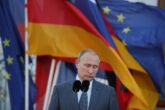June 18, 2022
Threading the needle on Ukraine’s EU integration
The Russian invasion of Ukraine has thrust EU enlargement back into the European debate. While Ukraine’s defense of its longstanding aspirations to join the Euro-Atlantic community has led to calls from many EU leaders to integrate Ukraine, both political and logistical barriers make full membership unworkable in the short term. To reconcile the need to quickly anchor Ukraine in the West with the realities of the Union’s intensive enlargement process, EU leaders should think outside the box and consider a new “preparatory membership” scheme that promises staged progress toward full integration with the bloc.
Ukraine has proven its Western vocation in recent months, fighting a war that Russian political scientist Andrey Kortunov has described as “a clash between very different ways of organizing social and political life.” The best form of support for Ukraine’s fragile but persistent movement toward liberal democracy would be a resolute commitment to bring it into the Euro-Atlantic community, embodied in the European Union and NATO. While this would ideally entail membership in both institutions, welcoming Ukraine could increase NATO’s likelihood of coming into direct military conflict with Russia and is therefore unwise in the current political context.
EU leaders should think outside the box and consider a new “preparatory membership” scheme that promises staged progress toward full integration with the bloc.
Integration with the European Union, by contrast, is unlikely to carry the same risks. Indeed, Russia has previously expressed its openness to potential EU membership for Ukraine, provided that it does not join NATO. Recognizing this dynamic, Kyiv has formally applied to join the European Union while easing its demands for NATO membership. It is worth noting, moreover, that Ukraine has viewed EU accession as its primary objective for many years—after all, the war with Russia in 2014 was sparked by Kyiv’s decision to pursue an Association Agreement with Brussels.
The desire for a closer embrace is far from one-sided. European Commission President Ursula von der Leyen promised in April to accelerate Ukraine’s accession to the Union, and in March the leaders of eight EU member states published an open letter backing Ukraine’s bid, asserting that the country “deserves receiving an immediate EU accession perspective.” Moreover, this support, while largely motivated by compassion for Ukrainians, is also underpinned by a more self-interested rationale, with the integration of Ukraine increasingly viewed as a key geostrategic objective for the European Union.
Read the full article from Encompass Europe.
More from CNAS
-
NATO's Biggest Threats
In the wake of a very short communiqué and an abbreviated Summit, many questions have been left unanswered by allies. How NATO would manage a reduction of military assets in E...
By Andrea Kendall-Taylor & Jim Townsend
-
How Russia Could Exploit a Vacuum in Europe
Putin would assume that with a smaller U.S. presence in Europe, the West would be forced to favor de-escalation, creating an environment the Kremlin would view as exceptionall...
By Andrea Kendall-Taylor, Jim Townsend & Kate Johnston
-
What a Stronger Europe Means for America
A more capable Europe will also mean a more independent Europe, more willing to defy U.S. priorities and make demands for cooperation. Wallander has been a key player in the t...
By Celeste Wallander
-
Transatlantic Security / Energy, Economics & Security
From Russia with RiskHere on the Bear Market Brief, a lot of what we focus on is, simply put, risk: what might happen, and what might it mean? On this episode, Rachel Ziemba, an adjunct senior fel...
By Rachel Ziemba




